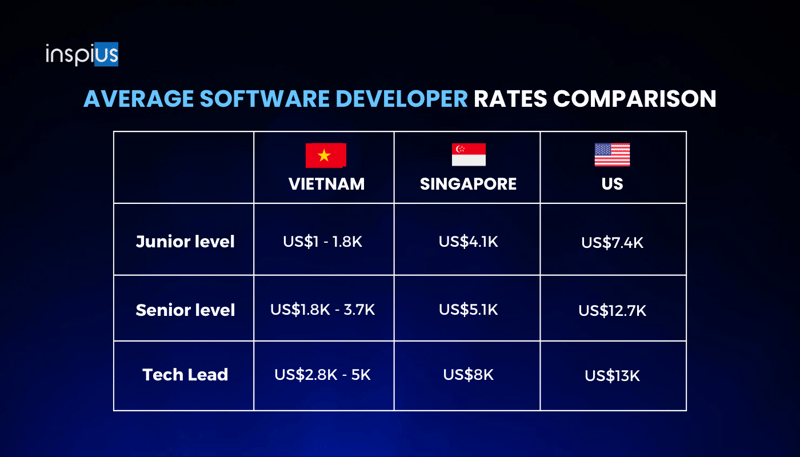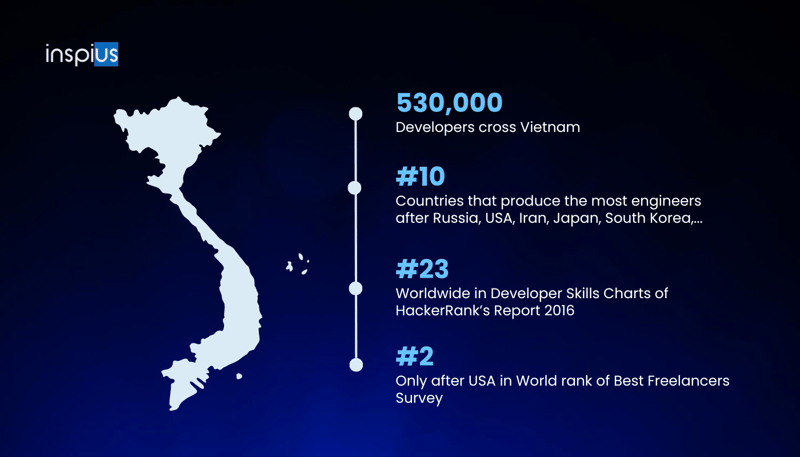 Backend Development
Backend Development
 PHP Tutorial
PHP Tutorial
 Why Hiring Offshore PHP Developers Could Be a Game Changer for Your Business
Why Hiring Offshore PHP Developers Could Be a Game Changer for Your Business
Why Hiring Offshore PHP Developers Could Be a Game Changer for Your Business
In the fast-paced world of tech, smart solutions often mean looking beyond local talent pools. If you're aiming to beef up your tech game without breaking the bank, consider the cool benefits of hiring offshore PHP developers. This isn't just about cutting costs—it's about tapping into a world of top-notch talent and scalable solutions.
Vietnam has become a leading hub for offshore engineering. In this article, we'll delve into and compare the advantages of Vietnamese software engineers with those from other countries.
1. Cost Efficiency
The primary allure of hiring offshore PHP developers is the substantial cost savings. Labor costs in offshore locations are typically lower due to the lower cost of living and different economic conditions. This allows businesses in higher-wage countries to save up to 50-70% on salaries without sacrificing quality. Such savings can be redirected towards other critical areas of business development.

In the US and Singapore, the elevated cost of living and highly competitive tech sectors push the salaries of IT professionals to premium levels, making hiring software developers in these countries an expensive proposition for both startups and established businesses.
2. Access to Specialized Skills
Offshore developers often possess specific skills and expertise that are either in short supply or highly priced in the local market. This global talent pool enables companies to find the perfect match for their technical requirements, ensuring that no project is hampered by local skill shortages.
In Vietnam, it's possible to find skilled developers at a lower cost without compromising the quality of their work.

As of 2024, Vietnam boasts approximately 530,000 software engineers, with universities and private institutions adding around 57,000 IT professionals to the workforce each year.
On the international front, Vietnamese developers have garnered significant recognition. They rank 10th worldwide in terms of engineering output and hold the 2nd spot in the Best Freelancers Survey, showcasing their competitive prowess.
Furthermore, HackerRank positions Vietnam 23rd globally for developer skills, highlighting their strong ability to handle complex coding tasks. This skill set renders Vietnamese software developers a crucial resource for tech projects that demand top-tier expertise and innovation.
3. Increased Flexibility and Scalability
Offshore hiring grants businesses the flexibility to scale their operations up or down without the logistical and financial constraints associated with local hiring. Whether responding to project cancellations, rapid growth, or changing market conditions, companies can adjust their workforce easily and efficiently.
4. Tips for Hiring Offshore PHP Developers
Conduct Comprehensive Vetting
Beyond assessing technical skills through interviews and tests, consider soft skills and cultural fit, which are critical for long-term collaboration.
Set Clear Expectations
Clearly articulate project goals, timelines, and workflow processes to ensure all team members are aligned.
Utilize Time Zone Differences
Strategically leverage time zone differences to enable round-the-clock work cycles, thus speeding up project completion.
Focus on Communication
Implement robust communication tools and regular check-ins to foster clear and continuous dialogue.
Conclusion
The strategic benefits of hiring offshore PHP developers, particularly from Vietnam, are compelling. They include significant cost advantages, access to a broad and skilled talent pool, and greater organizational flexibility. Businesses that effectively integrate offshore developers into their operations can enhance their capabilities, accelerate their projects, and achieve substantial competitive advantages in the marketplace.
The above is the detailed content of Why Hiring Offshore PHP Developers Could Be a Game Changer for Your Business. For more information, please follow other related articles on the PHP Chinese website!

Hot AI Tools

Undresser.AI Undress
AI-powered app for creating realistic nude photos

AI Clothes Remover
Online AI tool for removing clothes from photos.

Undress AI Tool
Undress images for free

Clothoff.io
AI clothes remover

Video Face Swap
Swap faces in any video effortlessly with our completely free AI face swap tool!

Hot Article

Hot Tools

Notepad++7.3.1
Easy-to-use and free code editor

SublimeText3 Chinese version
Chinese version, very easy to use

Zend Studio 13.0.1
Powerful PHP integrated development environment

Dreamweaver CS6
Visual web development tools

SublimeText3 Mac version
God-level code editing software (SublimeText3)

Hot Topics
 1657
1657
 14
14
 1415
1415
 52
52
 1309
1309
 25
25
 1257
1257
 29
29
 1230
1230
 24
24
 How does session hijacking work and how can you mitigate it in PHP?
Apr 06, 2025 am 12:02 AM
How does session hijacking work and how can you mitigate it in PHP?
Apr 06, 2025 am 12:02 AM
Session hijacking can be achieved through the following steps: 1. Obtain the session ID, 2. Use the session ID, 3. Keep the session active. The methods to prevent session hijacking in PHP include: 1. Use the session_regenerate_id() function to regenerate the session ID, 2. Store session data through the database, 3. Ensure that all session data is transmitted through HTTPS.
 Explain different error types in PHP (Notice, Warning, Fatal Error, Parse Error).
Apr 08, 2025 am 12:03 AM
Explain different error types in PHP (Notice, Warning, Fatal Error, Parse Error).
Apr 08, 2025 am 12:03 AM
There are four main error types in PHP: 1.Notice: the slightest, will not interrupt the program, such as accessing undefined variables; 2. Warning: serious than Notice, will not terminate the program, such as containing no files; 3. FatalError: the most serious, will terminate the program, such as calling no function; 4. ParseError: syntax error, will prevent the program from being executed, such as forgetting to add the end tag.
 PHP and Python: Comparing Two Popular Programming Languages
Apr 14, 2025 am 12:13 AM
PHP and Python: Comparing Two Popular Programming Languages
Apr 14, 2025 am 12:13 AM
PHP and Python each have their own advantages, and choose according to project requirements. 1.PHP is suitable for web development, especially for rapid development and maintenance of websites. 2. Python is suitable for data science, machine learning and artificial intelligence, with concise syntax and suitable for beginners.
 What are HTTP request methods (GET, POST, PUT, DELETE, etc.) and when should each be used?
Apr 09, 2025 am 12:09 AM
What are HTTP request methods (GET, POST, PUT, DELETE, etc.) and when should each be used?
Apr 09, 2025 am 12:09 AM
HTTP request methods include GET, POST, PUT and DELETE, which are used to obtain, submit, update and delete resources respectively. 1. The GET method is used to obtain resources and is suitable for read operations. 2. The POST method is used to submit data and is often used to create new resources. 3. The PUT method is used to update resources and is suitable for complete updates. 4. The DELETE method is used to delete resources and is suitable for deletion operations.
 PHP: A Key Language for Web Development
Apr 13, 2025 am 12:08 AM
PHP: A Key Language for Web Development
Apr 13, 2025 am 12:08 AM
PHP is a scripting language widely used on the server side, especially suitable for web development. 1.PHP can embed HTML, process HTTP requests and responses, and supports a variety of databases. 2.PHP is used to generate dynamic web content, process form data, access databases, etc., with strong community support and open source resources. 3. PHP is an interpreted language, and the execution process includes lexical analysis, grammatical analysis, compilation and execution. 4.PHP can be combined with MySQL for advanced applications such as user registration systems. 5. When debugging PHP, you can use functions such as error_reporting() and var_dump(). 6. Optimize PHP code to use caching mechanisms, optimize database queries and use built-in functions. 7
 Explain secure password hashing in PHP (e.g., password_hash, password_verify). Why not use MD5 or SHA1?
Apr 17, 2025 am 12:06 AM
Explain secure password hashing in PHP (e.g., password_hash, password_verify). Why not use MD5 or SHA1?
Apr 17, 2025 am 12:06 AM
In PHP, password_hash and password_verify functions should be used to implement secure password hashing, and MD5 or SHA1 should not be used. 1) password_hash generates a hash containing salt values to enhance security. 2) Password_verify verify password and ensure security by comparing hash values. 3) MD5 and SHA1 are vulnerable and lack salt values, and are not suitable for modern password security.
 PHP in Action: Real-World Examples and Applications
Apr 14, 2025 am 12:19 AM
PHP in Action: Real-World Examples and Applications
Apr 14, 2025 am 12:19 AM
PHP is widely used in e-commerce, content management systems and API development. 1) E-commerce: used for shopping cart function and payment processing. 2) Content management system: used for dynamic content generation and user management. 3) API development: used for RESTful API development and API security. Through performance optimization and best practices, the efficiency and maintainability of PHP applications are improved.
 Explain Arrow Functions (short closures) introduced in PHP 7.4.
Apr 06, 2025 am 12:01 AM
Explain Arrow Functions (short closures) introduced in PHP 7.4.
Apr 06, 2025 am 12:01 AM
The arrow function was introduced in PHP7.4 and is a simplified form of short closures. 1) They are defined using the => operator, omitting function and use keywords. 2) The arrow function automatically captures the current scope variable without the use keyword. 3) They are often used in callback functions and short calculations to improve code simplicity and readability.



